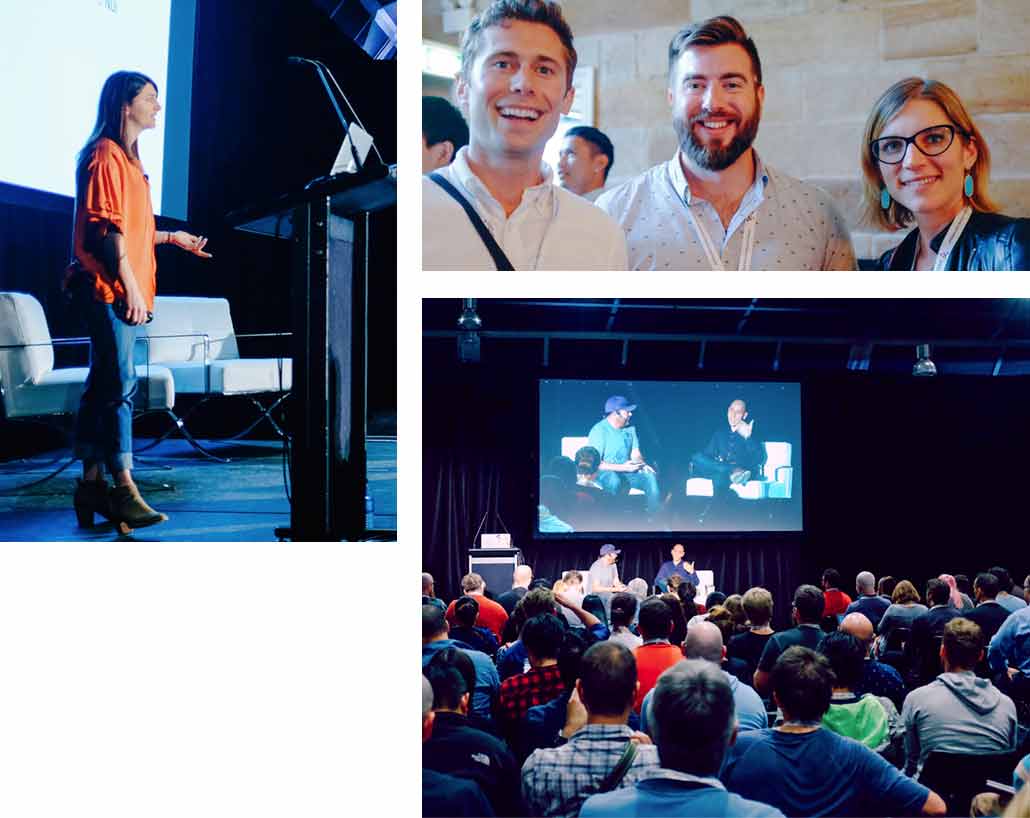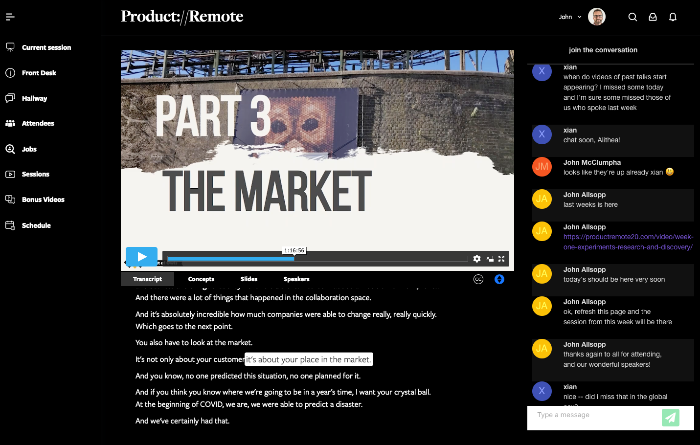Web Directions Conffab
Stream and download nearly 1,000 presentations from hundreds of world leading experts at 45 conferences…and counting
With free and paid levels, keep up to date with all that's happening in our industry at your own pace.
accessibility engineering for front end developers
If you're registered for the conference, you should have receieved emails from us about logistics.
If you've not received any, please search spam filters etc for an email from webdirections.org
If you still can't find it, email us [email protected]
Once you get your login details, you can login to the conference site and get settled in.
Accessibility has been central to the Web since its inception (it's called the World Wide Web to reflect the intention of its creators that the Web be accessible to all regardless of among other things disability).
There are many great accessibility focussed conferences around the world, so why another one? Most of those conferences are designed for accessibility experts, and often address a broad range of topics associated wth accessibility.
We've created Access All Areas (AAA) for web and front end developers, for many of whom accessibility engineering is a relatively small part of their day-to-day. Our aim is to keep front end professionals up to date with developments in accessibility technologies and practices, to help them deliver a web for all.
Access All Areas is for web and front end developers, engineering managers, CTOs–everyone responsible for developing web sites and applications.
All Web Directions conferences feature in-depth knowledge from real world experts. Some you'll know, many you won't, but all bring a world of experience and knowledge.

We're incredibly excited, and privileged to have Sara Soueidan as our convenor, putting together the program for this inaugural edition.
Sara's a Web UI and design systems engineer, who helps companies and organizations build modern, resilient, and inclusive Web user interfaces and design systems, with a strong focus on responsive design, performance, and accessibility. She’s renowned as a speaker and educator.

With free and paid levels, keep up to date with all that's happening in our industry at your own pace.
In response to the unique challenges of COVID-19 we transformed our conferences into remote only events. But we wanted to go way beyond what most online events delvier.
Building on the extensive work we've done with our conference presentation platform Conffab, our conferences have been re-imagined from the ground up the conference experience, not just ports of traditional conferences to the Web.
With a focus on highly engaging, expertly filmed and edited, screen-oriented presentations, alongside spaces to connect, communicate and keep in touch with everything around the conference, you'll be immersed as if you were there–maybe even more so.

Most online conferences run just like in-person conferences–one or two jam-packed days, of live streamed presentation. But with so many folks working remotely, and spending so much of their day in front of a screen we felt it was imperative to rethink this, and do something differently.
Access All Areas takes place over 2 consecutive Fridays in late 2021. It will run for around 4 hours each session (with a bit of downtime built-in). Plus will run it 3 times so wherever you are in the world, you can participate along with your peers, from the comfort of your own home (or maybe even your office).
We've brought together a world–class lineup of experts for you.

We're incredibly excited, and privileged to have Sara Soueidan as our convenor, putting together the program for this inaugural edition.
Sara's a Web UI and design systems engineer, who helps companies and organizations build modern, resilient, and inclusive Web user interfaces and design systems, with a strong focus on responsive design, performance, and accessibility. She’s renowned as a speaker and educator.
Read More

Accessibility overlays bring promises of accessible sites in one line of code, but experiences from users tell us the opposite. We will look at the guarantees, the marketing efforts, the code efforts, and lived experiences of users.
Read More

By now you probably know the first rule of ARIA: Don't use ARIA, unless you really need to. Because sometimes, we do need to use ARIA. But when should we use ARIA? And how should we use it? These questions can leave us high and dry!
This session is more than a simple overview of what ARIA is. It's an in-depth exploration of common ARIA roles, states, properties, and techniques that we can use to increase the accessibility of our web pages or applications. Don't fret, we're not going to dive head first into cold and murky water!
Read More

There’s a wide variety of screen readers available today — NVDA, JAWS, VoiceOver, Narrator, and TalkBack to name a few. Much like web browsers, each has its own strengths, weaknesses, and unique quirks.
In this talk, we’ll dive into why testing with screen readers is important, the major differences between them, and strategies you can use to prioritize and debug screen reader issues that surface in your accessibility work.
Read More

Are you coding for accessibility? Have you ever wondered how the accessibility information of the elements you've used and components you're building is exposed to assistive technologies, or why every accessibility person ever says: “Use native elements!”?
With this talk I aim to fill in the blanks by discussing how the Accessibility APIs work together with HTML elements, WAI ARIA and the Accessibility Tree to make the magic happen by extracting accessibility information from web interfaces and presenting it to assistive technologies.
Read More

Accessibility talks typically focus on understanding standards and code, but there’s something that’s more important to understand before you even start thinking about WCAG or ARIA. It’s assistive technology.
What types are there and how do they work? We’ll dive into the lesser know alternative navigation tools like Dragon NaturallySpeaking, switch systems and on screen keyboards. Once you know more about assistive technology you can better understand the impact of following or not following WCAG and you can test that your accessible code actually makes sense.
Read More

Google’s built-in testing tool Lighthouse judges the accessibility of our websites with a score between 0 and 100. It’s laudable to try to get a high grading, but a score of 100 doesn’t mean that the site is perfectly accessible. To prove that Manuel Matuzović carried out a little experiment.
Read More

In this talk Samuel Proulx, Accessibility Evangelist at Fable and blind since birth, will walk you through low-effort, high yield opportunities for you to improve accessibility in your apps and websites. It is tailored to developers and will cover major items within the context of the W3C principles, as well as informed by his experiences as a screen reader user and member of a community of people with disabilities
Read More

A look into color contrast and WCAG. What are the guidelines, how to achieve those guidelines, tools people can use for color contrast checking, and other tips and tricks to help people understand and achieve great color contrast in their projects.
Read More

Forced colors, or Windows high contrast mode (a "misnomer", we'll get to that), is a way for browsers to completely overwrite your websites design with a user specified style. The CSS Media query of the same name can help you adapt, or compensate, for this radical change in your sites design. But what should you adapt to, and how? Join Kilian in this talk to explore the what, why and how of forced colors.
Read More

Specs are usually not very fun, but I have learned that reading the ARIA specs is important to fully understand all the various options that are available. In this presentation, I will walk you through the ARIA spec and show you how to make the most out of it to create custom components with ARIA.
Read More

Live regions help us expose useful information, and notify users with minimal distraction. However, they are frequently misused in many modern Web applications. Ugi will talk about how to create live regions, how to debug them, and rules to make them truly accessible for all.
Read More

Shared semantics is the web's killer feature that allows developers create accessible experiences. In this talk, Hidde dives into the meaning of semantics (no pun intended), how it improves your site, specific gotchas and the future.
Read More

Let's clear the air about animation and inclusive design. It's a common misconception that things like inclusive design and accessibility only come at the cost of design details like motion, but that's just not the case. Whether it's microinteractions, animated illustrations, or larger animated experiences, a little care and consideration can go a long way towards getting the best of both worlds.
In this session Val will show you how to build animated interactions with inclusivity in mind from the start. We'll discuss how to apply web accessibility guidelines to modern web animation, when and how to implement reduced motion, and approaches to building up animated interactions for a solid standards base.
Read More

Ever wondered how screen readers do what they do? Ever wondered what screen readers actually do come to think of it?
Who uses them? What do they sound like? Where do they get their information from? What is it with screen readers and punctuation? And what exactly does my code have to do with it anyway?
Find out all this and more in What You See Is What I Get - one screen reader user's explanation of how it really works.
Read More

The Scalable Vector Graphic (SVG) is a preferred graphic format to use on the web today. Let’s see how the shift toward using SVG images will impact users of assistive technology (AT) & what you need to do to ensure a great experience for everyone! Attend this talk to learn how to implement accessibility in any type of SVG.
Read More
Attend your wayAttend Access All Areas online, or as part a membership to our comprehensive conference platform, Conffab. Conffab features hundreds of conference videos from our conferences, and other great conferences around the world. |
Conffab Premium
|
Access All Areas+
|
Access All Areas classic
|
|
|
|
|
|
Access All Areas Conference
|
|
|
|
Access All Areas Conference VideosAll the Access All Areas conference presentations, captioned, transcribed and more |
|
|
|
Conffab Presentation Library1 year access to our growing library of hundreds of conference presentation videos from world leading conferences |
|
|
|
All 2021 online Web Directions conferencesAccess to all 6 planned online Web Directions conferences in 2021–50+ hours of content. |
|
||
|
|
|
|
Attend Access All Areas online, or as part a membership to our comprehensive conference platform, Conffab.
Conffab features hundreds of conference videos from our conferences, and other great conferences around the world.
We have diversity scholarships available for all our events. These provide full attendance just like any other attendee. We don't draw attention to those who have received a scholarship, but do look to make connections between them, and with our diversity sponsors, to help ensure the most valuable possible experience.
Our Scholarships focus on people who are unemployed, under-employed, self employed or in the early stages (up to 3 years) of their careers who identify as belonging to a group or groups under-represented at events like ours, and who might otherwise find it difficult to afford to attend.
Read more and apply at our diversity page.
The conference CSS deserves
a conference on front end performance
a conference all about JavaScript
a conference on progressive web apps and web platform
accessibility engineering for front end developers
privacy, security, identity for front end developers
The best of 2022, remixed, and free!
We work closely with our partners and their technologies to deliver world leading online conferences.
Contact us for more on how we work can work with you to help you be even more awesome.

Web Directions is the must-attend event of the year for anyone serious about web development.
Phil Whitehouse,
Innovation Lead DigitasLBi

I’ve been admiring the Web Directions events for years, and was honored to be part… What a fantastic event!
Ethan Marcotte,
inventor "responsive Web design"

Out of any conference, Web Directions is far and away our favourite
Dave Greiner,
founder Campaign Monitor
Co-founded and now run by John Allsopp, Web Directions has for nearly 20 years brought together leading developers, engineers, visual, IxD, UX and product designers, Art and Creative Directors, product managers indeed everyone involved in producing web and digital products to learn from one another, and the World's leading experts across this vast field.
We spend our lives thinking about what comes next, keeping up with trends in technology, practices and processes, and filtering the hype, to make sure you don't miss trends that matter, and don't waste time on hype that doesn't.
We promise attending one of our events will leave you significantly better versed in the challenges you face day to day, and in solutions for addressing them.

John Allsopp has been working on the Web for nearly 30 years. He's been responsible for innovative developer tools such as Style Master, X-Ray and many more. He's spoken at numerous conferences around the World and delivered dozens of workshops in that time as well.
His writing includes two books, including Developing With Web Standards and countless articles and tutorials in print and online publications.
His "A Dao of Web Design" published in 2000 is cited by Ethan Marcotte as a key influence in the development of Responsive Web Design, who's acclaimed article in 2010 begins by quoting John in detail, and by Jeremy Keith as "a manifesto for anyone working on the Web".
For over a decade, we've worked hard to create inclusive, fun, inspring and safe events for the Web Industry.
As part of our commitment to these values, we've adopted a code of conduct for all involved: ourselves, our speakers, our partners and our audience.
If you have any concern or feedback, please don't hesitate to contact us.